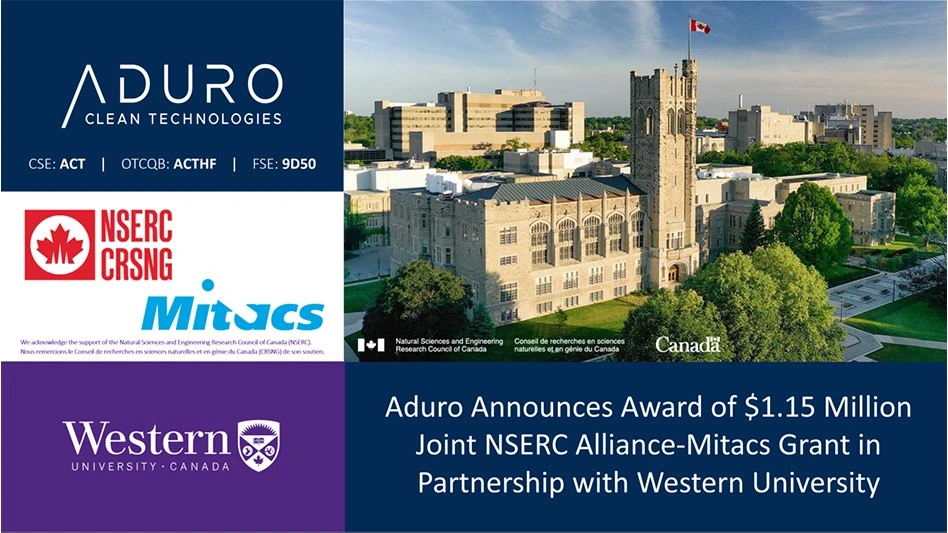
Image courtesy of Aduro Clean Technologies
Aduro Clean Technologies, Sarnia, Ontario, has announced it will partner with the University of Western Ontario on a research project that will help the company further develop its process for using water-based technologies to chemically recycle plastics.
The company says the project will begin in November and last for three years. It will be funded by a joint $1.15 million grant awarded by the Ottawa, Ontario-based National Sciences and Engineering Research Council (NSERC) Alliance and Mitacs, a Canadian nonprofit research organization that operates programs in fields related to industrial and social innovation. Aduro says it will contribute an additional $382,500 over the duration of the project.
Aduro says the project’s goal is to evaluate the effects of intrinsic and extrinsic contaminants in plastic feedstocks, including food, organic waste, plasticizers and fillers under varying conditions to maximize output, quality and yield. The project also aims to improve pre- and post-processing techniques.
The company says the commercial goal for the project is to be able to develop optimal strategies that will minimize the need for expensive sorting and separation systems for pre-processing treatment, and it says it expects to advance and further augment its Hydrochemolytic (HCT) process for the chemical recycling of mixed postconsumer industrial and consumer plastics.
According to Aduro, the HCT process involves activating unique properties of water in a chemistry platform that operates at relatively low temperatures and cost, allowing it to chemically recycle plastic scrap, convert heavy crude and bitumen into lighter, more valuable oil and transform renewable oils into higher-value fuels or renewable chemicals.
In collaboration with the Aduro research team, the project will be led by Western University professors Dr. Paul Charpentier, Department of Chemical and Biochemical Engineering and Mechanical and Materials Engineering, and Dr. Cedric L. Briens, Department of Chemical and Biochemical Engineering and director of research and development (R&D) at the Institute for Chemicals and Fuels from Alternative Resources.
In addition to the grant funding, Aduro says the partnership with Western University will provide very cost-effective access to state-of-the-art laboratory facilities, reactors and analytical equipment, as well as an opportunity to build its future human capital assets by engaging top talent who will expand their knowledge and expertise in the company’s patented HCT process. Over the course of three years, the project will employ two postdoctoral fellows, three doctoral students, five Masters of Engineering, one research engineer and eight undergraduate students.
“The project is a great opportunity to again collaborate with Aduro,” Charpentier says. “The project will also support advanced training of many graduate students and postdoctoral fellows who will be the research and industry leaders of tomorrow in chemical recycling.”
Aduro says it will own all intellectual property generated from the project, though it will encourage the researchers to publish relevant academic papers once the data is protected.
“We are honored and excited to once again collaborate with Western University and professors Dr. Paul Charpentier and Dr. Cedric L. Briens. This project will deliver critical insights and strategies for pre-treatment and post-processing techniques in support of Aduro’s HCT,” Aduro CEO Ofer Vicus says. “On behalf of Aduro, I would like to thank NSERC and Mitacs for their significant contribution and support in advancing our next-generation chemical recycling technology.”
Latest from Recycling Today
- U.S. Aluminum Co. explores aluminum fabrication plant in Oklahoma
- Sonoco completes portfolio transformation
- Eriez Shred1 data demonstrates scalable copper control
- RCI selects CurbWaste as exclusive operational management platform
- Updated: Supreme Court strikes down IEEPA tariffs
- Recycling Today Media Group launches Scrap Expo Lunch & Learn Webinar Series
- LyondellBasell scales back recycling target
- Former Liberty UK mills eyed by 3 suitors





